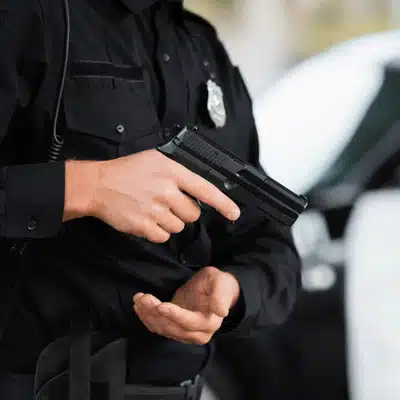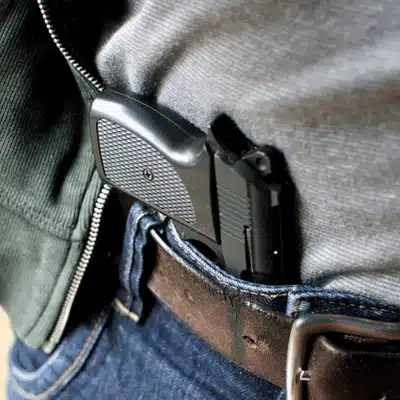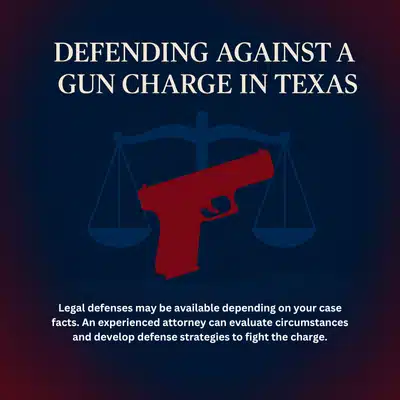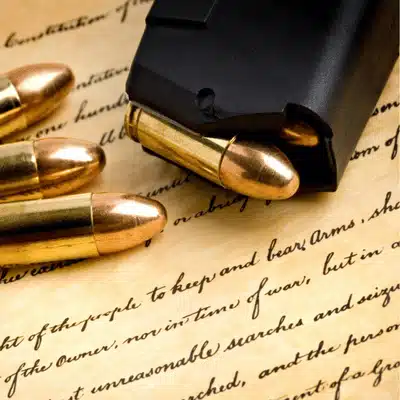Texas has strong gun rights and some of the nation’s most open gun laws. Recent changes like constitutional carry allow many adults to carry handguns without a license. But this freedom comes with complex rules. Breaking those rules can land you in serious trouble.
After permitless carry became law, convictions for unlawfully carrying weapons in Texas jumped from just over 1,000 in 2020 to nearly 7,000 in 2022. Many law-abiding Texans learned the hard way that gun charges carry severe consequences despite Texas’s strong gun culture.
If you’re facing gun charges in Texas, contact our experienced criminal defense attorney team immediately for a free consultation.
Under Texas law, adults 21 or older may carry a handgun without a license; the 2021 constitutional carry change removed the permit requirement.
Yet permitless is not lawless; Penal Code 46.02 spells out criminal offense.
Statute 46.02 says a person commits an offense if person intentionally, knowingly, or recklessly carries a handgun on or about his or her person in prohibited circumstances.
Carrying is unlawful for anyone under 21, anyone with a recent serious conviction, anyone engaged in criminal activity, or anyone intoxicated at the moment of possession.
Openly carried handguns need a holster, and inside a motor vehicle the weapon must stay out of plain view unless holstered on the carrier; the same rule applies to any motor vehicle or watercraft.
Inside a vehicle or watercraft, you must commit no offense beyond a Class C traffic offense; having illegal drugs on board can still bring an unlawful carrying charge and escalate penalties.
Adults may keep firearms on private property or inside their motor vehicle without a permit, but once they step into public spaces every restriction above applies and violations quickly become offenses under texas law, strictly enforced.

Both Texas and federal law list people barred from firearms; slip into those categories and a gun charge in Texas for illegal possession follows.
Under Texas Penal Code Section 46.04, a felony conviction ends firearm rights until five years after release or mandatory supervision, and then possession is limited to private property.
Federal law is stricter: any past conviction creates permanent unlawful possession status, and a felon-in-possession count carries a minimum sentence reaching ten years.
A domestic violence misdemeanor also bans guns forever; possess firearms afterward and a person commits an offense that brings serious legal trouble.
If an active protective order exists, having a handgun on or her person or within the person’s control turns into a third degree felony offense.
Texas gun laws block anyone in a mental institution, dishonorably discharged from the armed forces, unlawful users of controlled substances, and undocumented immigrants from firearm possession.
Review your criminal history before owning or transporting firearms in a vehicle or watercraft; ignoring the rules can invite steep penalties.
An experienced attorney can explain constitutional carry limits, build a good defense, and raise doubt if charges in Texas threaten grave consequences.
Even if you legally carry, the law forbids firearms in certain locations. Violating these location-based restrictions is a crime under Texas Penal Code Section 46.03.
All levels of schools are off-limits for firearms on the premises. This includes school buildings, grounds, and school buses. Colleges and universities also ban weapons on campus buildings and grounds, unless you are a License to Carry holder in areas allowed by campus policy.
You cannot carry a firearm into government buildings like courthouses when court is in session or polling places on Election Day.
Firearms are prohibited at any business that derives 51% or more of its income from on-premises sale of alcohol. Carrying a gun into a 51% establishment is a felony.
Firearms are banned in correctional facilities, including county jails and civil commitment facilities. You may not carry a gun into a hospital, nursing home, or mental institution without written authorization.
The law prohibits guns in state or federal law courthouses, secured airport areas beyond TSA checkpoints, and post offices.
Most violations are felony offenses, meaning a conviction could result in years of imprisonment.

Texas law outlaws possession of certain weapons altogether. These are called prohibited weapons. Penal Code Section 46.05 lists several prohibited items including explosive weapons, machine guns, short-barreled firearms, unregistered silencers, armor-piercing ammunition, and improvised explosive devices.
Under the Government Code and the Penal Code, a person commits an offense of unlawful possession if they knowingly keep or recklessly carries any of these concealed weapons. Simple unlawful possession of most prohibited weapons is classified as a third degree felony in Texas, punishable by 2 to 10 years in prison, and unlawful possession may carry significant consequences. Using such weapons to inflict serious bodily injury or bodily injury can elevate charges.
The law also criminalizes firearm smuggling and unlawfully transferring a handgun to a child under 18, another third degree felony. For civilians owning firearms, the Texas Department of Public Safety stresses compliance with licensing rules to avoid third degree felony exposure.
Gun-related offenses in Texas carry a wide range of penalties, from minor misdemeanors to long-term imprisonment, and transporting firearms improperly can bring serious consequences even for first-time offenders.
A Class C misdemeanor is a crime punishable by a fine up to $500 with no jail time; very few gun offenses, such as certain paperwork errors when a person carries a concealed handgun with the firearm accessible only briefly, fall in this category.
Many common gun charges are Class A misdemeanors, carrying up to one year in county jail and a fine up to $4,000. The standard unlawful carrying of a weapon offense is typically a Class A misdemeanor, and anyone who chooses to carry a handgun in a motor vehicle or watercraft without meeting statutory requirements risks the same penalty.
A state jail felony is punishable by 180 days to two years in a state jail facility, plus a fine up to $10,000.
Many serious gun charges are third degree felonies, carrying two to ten years in prison and up to a $10,000 fine. Examples include felon in possession of a firearm, carrying of a weapon in prohibited places, or using a deadly weapon during another crime. Someone who decides to carry a handgun at an airport security checkpoint also faces a third degree felony.
Second degree felonies are punishable by two to twenty years in prison. If a prohibited person is caught trying to carry a handgun in public, the law upgrades that to a second degree felony with a minimum sentence of five years.
Federal firearm offenses can impose even heavier penalties. Using or carrying a firearm during a federal drug-trafficking crime is a crime punishable by mandatory minimum sentences of at least five years.
A gun conviction leaves you with a criminal record that can hinder employment, affect professional licenses, impact housing, and remove civil rights. If you are charged with carrying of a weapon or any firearms offense, remember that every decision to carry a handgun can have life-altering effects.
Facing serious gun charges? Do not risk your future. Contact our defense team now for aggressive representation.

Legal defenses may be available depending on your case facts. An experienced attorney can evaluate circumstances and develop defense strategies to fight the charge.
Many gun charges arise from police searches. Your attorney will examine whether the search that led to finding the firearm was lawful. If police violated your Fourth Amendment rights, the firearm evidence might be suppressed.
In possession cases, the State must prove you intentionally and knowingly possessed the firearm. If the gun was not under your person’s control or you did not know it was there, this creates reasonable doubt.
Texas weapons charges have numerous exceptions and defenses. You might be exempt due to your status, such as being a member of the armed forces on duty or being on your own private property.
A skilled attorney can negotiate with prosecutors to reduce charges or secure alternative sentencing. Sometimes completing a gun safety course can persuade a prosecutor to be lenient.
Your attorney will hold the State to its burden of proof. The prosecution must prove every element beyond a reasonable alibi. A strong defense pokes holes in the State’s case wherever possible.
Given the complexity of gun laws and high stakes, knowledgeable legal counsel is vital to guide you through criminal procedure and build the best possible defense.

Facing gun charges in Texas is serious; knowing the laws is the first step to protecting your rights. Texas gun statutes blend state and federal rules, and the landscape constantly changes. Regulations for concealed carry differ from those covering machine guns.
If you are charged with unlawful carrying, possession by a felon, possession of a firearm in a bar, or any weapons count, act quickly. Even a class A misdemeanor tied to an ordinance regulating traffic at an event can escalate when a person carries a weapon. Early intervention by a defense attorney makes a huge difference.
An arrest is not a conviction. You have the right to fight the allegations. By hiring experienced counsel, you gain an advocate who understands Texas gun laws and can tailor a defense. Cases range from class A misdemeanor improper carrying to felonies tied to possession of a firearm during a domestic violence episode.
Your attorney can negotiate with prosecutors for lesser charges and ensure your side is heard, sometimes trimming possession of a firearm counts to civil citations. The stakes are high: your freedom, record, and Second Amendment rights are at risk.
With knowledgeable counsel and a proactive defense, you can pursue the best outcome, whether dismissal, acquittal, or reduced penalty.
Gun ownership is a valued right in Texas, but it carries duties. When legal trouble strikes, a strong defense is your best protection.
Do not face gun charges alone. Contact our defense team today for immediate representation and safeguarding of your rights.